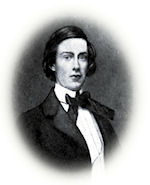
August 7. — John C. Breckinridge was serenaded at a hotel in Baltimore, and in response essayed to address those assembled in the street, but was compelled to desist by the uproar of the crowd, who shouted for the “Union,” “Crittenden,” “Scott,” etc. — Baltimore American, August 9.
— Gen. Magruder, C. S. A., with a force of 7,000 men, including 200 cavalry and eight pieces of artillery, viz., three Parrott guns, four howitzers, and one rifled cannon, took up a position on Back River, three miles from Hampton, Virginia. The intention was to draw out the national forces, attack Camp Hamilton or Newport News if practicable, and at least to destroy Hampton, so as to prevent its use by the U. S. troops for winter-quarters. Gen. Butler at once repaired to Hampton Bridge, where he remained until 11 o’clock P. M. Col. Weber erected a barricade near the Hampton end of the bridge, and placed a strong guard at various points near.
A few minutes past midnight, Gen. Magruder, with about 500 Confederates—some of them belonging in Hampton—entered the town, and immediately fired the buildings with torches. A greater part of the five hundred houses were built of wood, and no rain having fallen lately, the strong south wind soon produced a terrible conflagration. There were perhaps twenty white people and double that number of negroes remaining in the town from inability to move, some of whose houses were fired without waking the inmates. They gave Gary Jones and his wife, both of them aged and infirm, but fifteen minutes to remove a few articles of furniture to the garden. Several of the whites and also of the negroes were hurried away to be pressed into the Confederate service. Mr. Scofleld, a merchant, took refuge in a swamp above the town. Two negroes were drowned while attempting to cross the creek. A company of rebels attempted to force the passage of the bridge, but were repulsed with a loss of three killed and six wounded. They then withdrew. The fire raged all night and entirely destroyed the town.—(Doc. 168.)
—The Ohio Democratic State Convention met at Columbus to-day and nominated H. J. Jewett for Governor and John Scott Harrison for Lieutenant-Governor. A series of resolutions were adopted. The third recommends the legislatures of the States to call a National Convention for settling the present difficulties and restoring and preserving the Union. The sixth resolution condemns the President’s late attempt to suspend the writ of habeas corpus. —National Intelligencer, August 10.
—The United States gun boat Flag arrived at Fort Mifflin, on the Delaware River, this morning with thirty-six rebel prisoners, taken from the rebel war vessel, Petrel, formerly the revenue cutter Aiken, seized at Charleston last winter. The Aiken fired at the St. Lawrence, off Charleston, mistaking her for a merchant vessel, when the St. Lawrence returned a broadside, sinking the rebel. Five of the crew were lost, and the rest rescued and placed on board the Flag.—Philadelphia Press, August 8.
—Isham G. Harris, Governor of Tennessee, appeals to the people of that State “to raise, organize, and thoroughly prepare a reserve force of thirty thousand volunteers.”—(Doc. 169.)
——-
Late addition to Volume 3:
August 7.—In the C. S. Congress, a bill was reported favorably from the Military Committee to increase the military force of the Confederacy to the extent of four hundred thousand men.—Richmond Enquirer, August 9.









